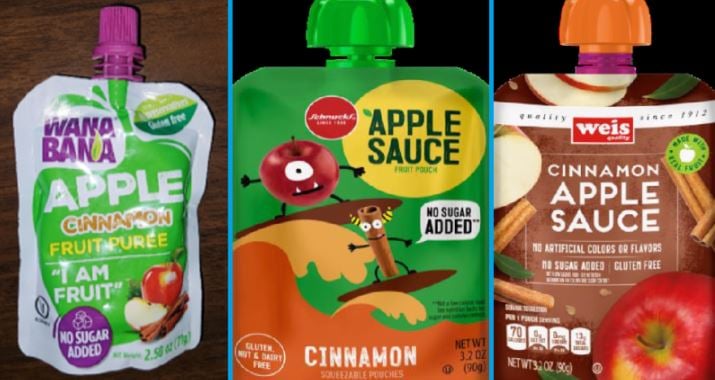Couple Claims ‘Healthy’ Snack Left Children With Lead Poisoning

HICKORY, N.C. — A North Carolina couple claimed in court that the manufacturer of a fruit puree they bought as a healthy snack for their kids negligently sold products contaminated with large amounts of lead, leading to concerns the children will face life-long health issues.
In a lawsuit filed on their behalf by the Motley Rice law firm, Nicole Peterson and Thomas Duong said they began purchasing WanaBana Apple Cinnamon Fruit Puree pouches at their local Dollar Tree store as part of an effort to provide a “nutritious and healthy” diet for their two minor children.
In doing so, Peterson said, she relied heavily on the pouches’ labeling, which indicated the product was “kosher,” “additive-free” and “USDA Organic.”
About six months later, as part of the annual physical exams, both children — a 3-year-old girl and 11-month-old boy — had blood tests that revealed they had elevated levels of lead in their systems.
Concerned, the couple had the water in their residence tested, but the result showed only a miniscule amount of lead in the water. They also had themselves tested, but were told their blood lead levels were within a normal range.
In the meantime, subsequent tests on the children showed the blood lead levels had nearly doubled in a matter of months.
In response, the Catawba County, North Carolina, Environmental Health Department conducted a lead investigation at the children’s daycare, but found nothing that could be contributing to their lead problem.
Finally, the children’s physician recommended the couple conduct an “elimination diet” to audit the food consumed in the household,
Through that process, the couple determined that the only food consumed by the children that was not also consumed by them was the defendant’s fruit puree.
That led to testing by the North Carolina State Laboratory of Public Health, which found the defendants’ Apple Cinnamon Puree contained amounts of lead that exceeded the acceptable limit.
By then, the couple had eliminated the puree pouches from the children’s diet and the level of lead in their blood began to go down.
But, because lead poisoning can manifest itself throughout an individual’s lifetime through developmental delays, learning difficulties, irritability, loss of appetite, sluggishness, fatigue, abdominal pain, vomiting, constipation, hearing loss and seizures, they will have to continue treatment and monitoring indefinitely.
In October, the FDA issued a public health alert on the matter and coordinated an investigation with state authorities, and shortly thereafter announced a recall of the products.
The agency is said to have found WanaBana failed to have appropriate preventative control and monitoring procedures in place to minimize or prevent future hazards.
In addition, the complaint says, the FDA Inspection report identified that WanaBana’s processing facility had no controls in place to account for metal contamination from the rough edges, chips and pitted areas that are present on the conveyor belt which processes the puree in the products.
Attorneys for the couple and other affected families told The Well News Wednesday that despite the recall, they remain concerned some of the pouches may still be on the shelves of Family Dollar and Dollar Tree stores.
In the past year, the FDA has received 89 specific complaints about lead poisoning caused by the defendants’ products.
The plaintiffs are seeking actual damages, economic damages, compensatory damages, court costs and attorneys fees.
The Well News attempted to contact WanaBana, Dollar Tree, and others involved for comment.
A spokeswoman for Dollar Tree said, “We are aware of the lawsuit and cannot comment on the pending litigation. Know that we take the situation very seriously and are committed to the safety and integrity of the products we sell.
The spokeswoman went on to say that after WanaBana announced the voluntary recall of its Apple Cinnamon Fruit Puree pouch, “Dollar Tree locked its registers to prevent sales and instructed stores to remove the product from the shelves and destroy the affected packages according to FDA guidelines.
“We enforced these directives, including through audits by field teams, utilization of a third party to confirm the effectiveness of the product removal and notification signage in our stores. We removed the product from shelves, destroyed it according to the recall guidance and have kept the register lock in place. We were also in regular contact with the FDA,” she said.
Dan can be reached at [email protected] and at https://twitter.com/DanMcCue

























